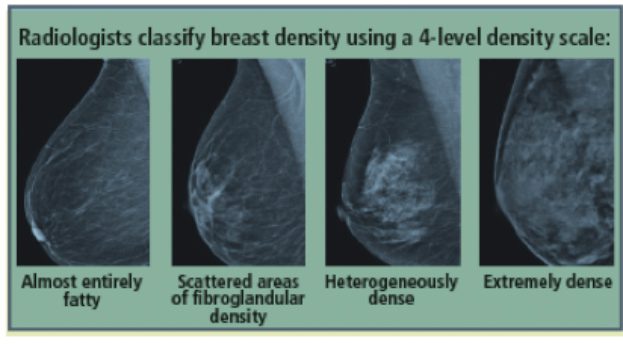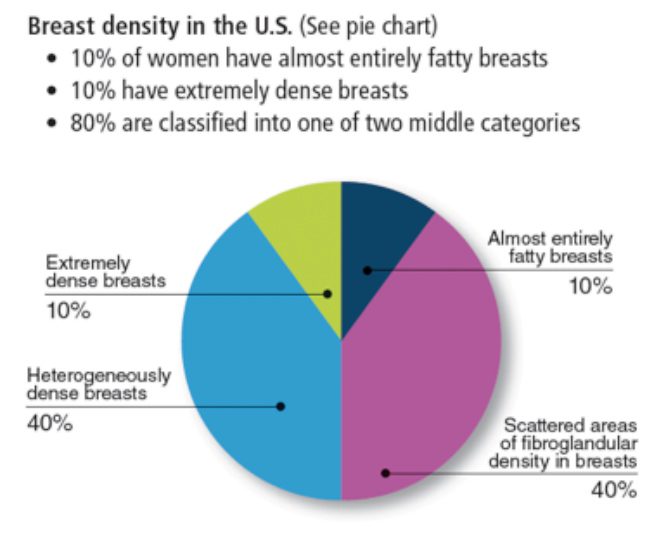From the American College of Radiology
What is breast density? Breasts are made up of a mixture of fibrous and glandular tissue and fatty tissue. Your breasts are considered dense if you have a lot of fibrous or glandular tissue but not much fat. Density may decrease with age, but there is little, if any, change in most women. How do I know if I have dense breasts? Breast density is determined by the radiologist — the doctor who reads your mammogram. There are four categories of mammographic density. The radiologist assigns each mammogram to one of the categories. Your doctor should be able to tell you whether you have dense breasts based on where you fall on the density scale.

Breast density in the U.S.

Why is breast density important? Having dense breast tissue may increase your risk of getting breast cancer. Dense breasts also make it more difficult for doctors to spot cancer on mammograms. Dense tissue appears white on a mammogram. Lumps, both benign and cancerous, also appear white. So, mammograms can be less accurate in women with dense breasts.
If I have dense breasts, do I still need a mammogram? Yes. A mammogram is the only medical imaging screening test proven to reduce breast cancer deaths. Many cancers are seen on mammograms even if you have dense breast tissue. Are any tests better than a mammogram for dense breasts? In breasts that are dense, cancer can be hard to see on a mammogram. Digital breast tomosynthesis (DBT), also called 3D mammography, provides images of the breast in “slices” from many different angles making some abnormalities easier to see. DBT increases the number of cancers seen without additional testing. Ultrasound (US) and magnetic resonance imaging (MRI) can help find cancers that can’t be seen on a mammogram. However, both MRI and US show more findings that are not cancer, which can result in added testing.
What should I do if I have dense breasts? What if I don’t? If you have dense breasts, please talk to your doctor. Together, you can decide which, if any, additional screening exams are right for you.
If your breasts are not dense, other factors may still place you at increased risk for breast cancer — including a family history of the disease, previous chest radiation treatment for cancer and previous breast biopsies that show you are high risk. Talk to your doctor and discuss your history. Even if you are at low risk, and have entirely fatty breasts, you should still get an annual mammogram starting at age 40.
At Bonita Community Health Center we have a state of the art 3D mammography unit, GE Senographe Pristina, which has been awarded highest rating with the FDA. Our facility is ACR accredited for mammography. Our board certified Radiologist is on site and will read your exam on the same day. The Radiologist reviews the results with every patient having a diagnostic exam and will happily review screening exams when requested by the patient.
BCHC accepts orders from any U.S. based physician. We accept most insurance. Call to make an appointment today – Scheduling 239-949-6112.
(239) 949-6112
www.bonitahealthcenter.com










